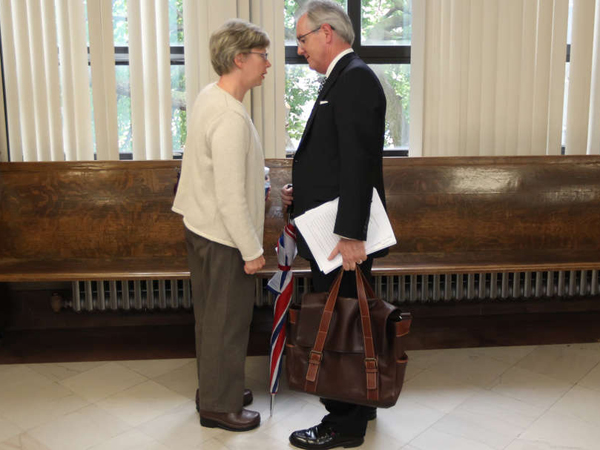Pa. case fuels debate on assisted suicide
Barbara Mancini and lawyer Fred Fanelli. Mancini faces charges for giving her father morphine he used to kill himself. (MICHAEL BRYANT / Staff Photographer)
If she lived in Oregon, Washington state, or Vermont, Barbara Mancini could have handed her terminally ill father the morphine he wanted, and there the story would have ended.
But in Pennsylvania, it was just the start of a legal saga that has refueled the national debate over assisted suicide and cast the 57-year-old Philadelphia nurse as either a compassionate daughter comforting a dying man, or a criminal enabler in his death.
Under the state penal code, "a person who intentionally aids or solicits another to commit suicide is guilty of a felony."
Mancini was arrested Feb. 7 and so charged. Conviction could mean up to 10 years in prison.
Mancini's lawyer, Fred Fanelli, said she acted out of love in giving Joseph Yourshaw, 93, of Pottsville, the morphine upon his request. Fanelli also contended that what Mancini did was legal even under Pennsylvania law, because Yourshaw did not need her help - he could have obtained the morphine himself - and his intention when he took it is unknown.
Laws that went into effect in Oregon 15 years ago, in Washington state four years ago, and in Vermont this year would allow actions like Yourshaw's and Mancini's. So would current bills in Pennsylvania and New Jersey. Both are patterned after Oregon's law, which says that if two doctors deem a terminally ill person mentally competent, he or she has the right to be prescribed a lethal drug dose. A daughter could pass it to her father without fear of penalty.
In Pennsylvania, and in this case, the issue is intent: Did Mancini hand Yourshaw the morphine knowing he would end his life? Or did she do it so he could ease his pain?
In Oregon, that distinction is not important.
Perhaps the most telling aspect of that law is how few take advantage of it.
Among the 32,000 Oregonians who died last year, 77 ended their lives after legally obtaining lethal doses; 38 others got drugs but didn't use them.
Yourshaw was under hospice care, with end-stage diabetes, renal failure, and heart disease, when he drank the morphine Feb. 7. Against his daughter's wishes, a hospice nurse called police, and Mancini was charged that day with aiding a suicide. Yourshaw was revived at a hospital, only to die four days later.
Mancini has been suspended from her job in the emergency room of a local hospital. Her legal fees have topped $90,000, said her husband, Joe.
Supporters of Oregon's statute say that laws against assisted suicide, such as Pennsylvania's, were not intended for cases like Mancini's. They apply to putting guns in the hands of unstable people, or bullying teens into killing themselves.
"Joe Yourshaw wasn't suicidal, even if he did intend to advance the time of death," said Barbara Combs Lee, who led the effort in 1997 to pass the Oregon law and founded the advocacy group Compassion & Choices.
"That's a rational end-of-life decision: I'm dying. My only choice is how long the process goes on, what it feels like for me, and what memories I leave my loved ones."
Opponents of Oregon-type laws argue that doctors should save lives, not help end them with lethal prescriptions.
In 1997, the Supreme Court unanimously ruled that Americans do not have a constitutional right to assisted suicide. But, Chief Justice William H. Rehnquist wrote, "it is widely recognized that the provision of pain medication is ethically and professionally accepted even when the treatment may hasten the patient's death."
Justice David Souter concurred that terminally ill patients may take medication "to alleviate pain, even when the medication is so powerful as to hasten death and the patient chooses to receive it with that understanding."
In 2006, the justices upheld Oregon's law and urged states to serve as laboratories.
"It's quite moving when you look at the evidence in Oregon," said State Sen. Daylin Leach (D., Montgomery), who introduced a bill like Oregon's. "There has not been a single case of demonstrated pressure or fraud. Look what happened. People get the medication, and . . . often they don't wind up taking it. Knowing that if it gets too bad, they have a way out is all they need."
His bill, however, "isn't going anywhere right now," he said. And until it does, "situations like this will continue to happen."
A similar bill introduced in New Jersey by Gloucester County Assemblyman John J. Burzichelli has cleared the health committee and is "working its way through the process," he said Tuesday.
mvitez@phillynews.com
215-313-3518
@michaelvitez
Read more at http://www.philly.com/philly/health/20131023_Pa__case_fuels_debate_on_assisted_suicide.html#eCG7BtEgVfvPouP4.99

No comments:
Post a Comment